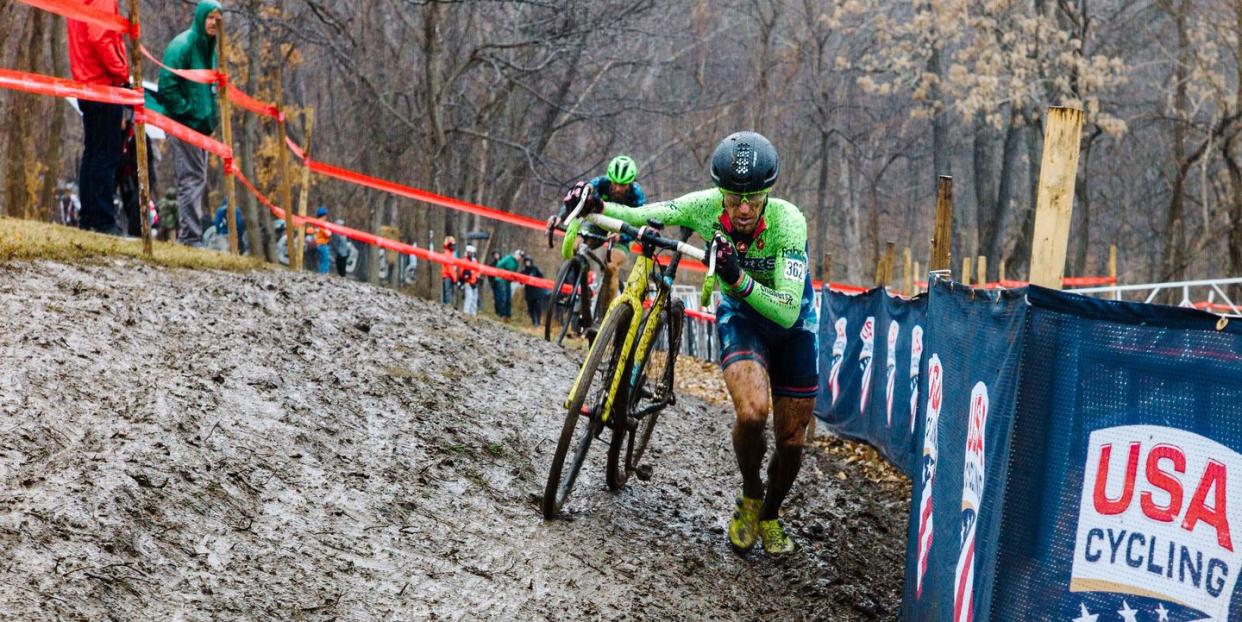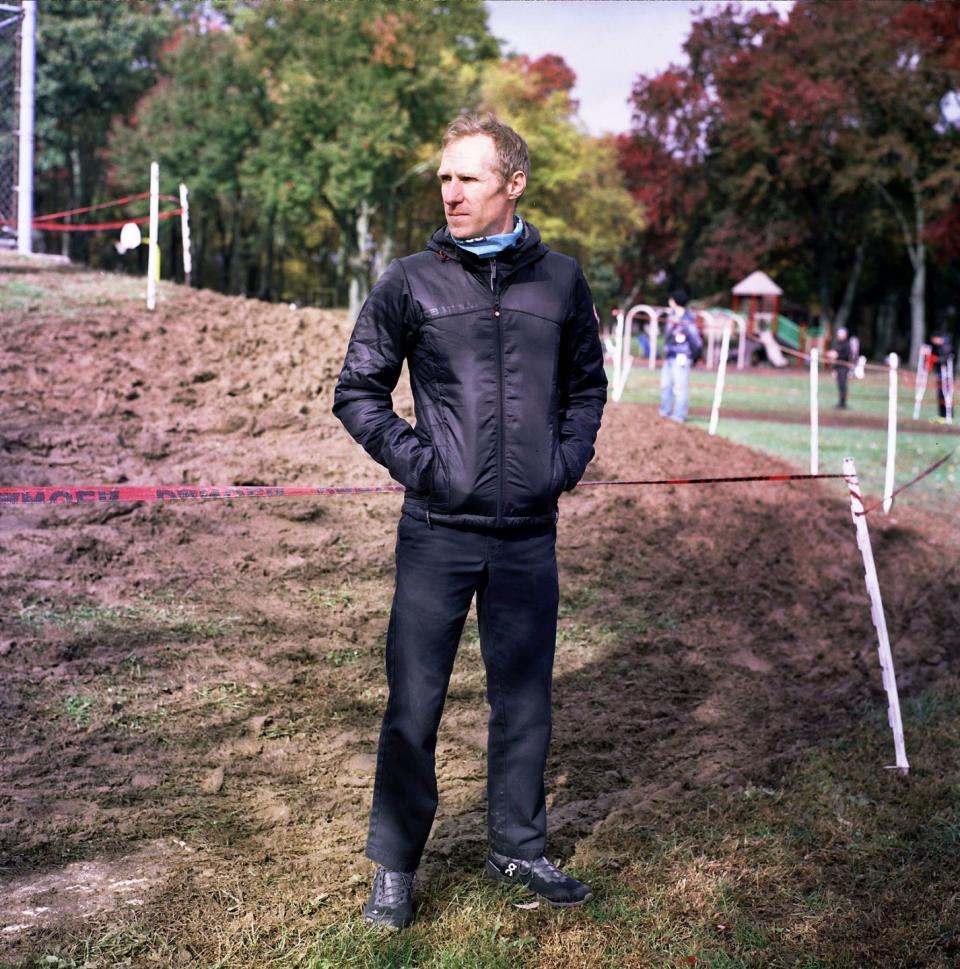Molly Cameron’s RIDE Organization Aims to Increase Diversity and Inclusion in Cycling

- Oops!Something went wrong.Please try again later.
Pro cyclocross racer Molly Cameron has been working for decades to save and improve the lives of transgender people. And lately, she’s been busier than ever. Cameron just announced the launch of her organization called RIDE, short for Riders Inspiring Diversity and Equality.
The mission of the organization is to improve the experience of all LGBTQ+ people in bicycling, and to educate and guide outdoor industries and the sport in general. RIDE wants to raise awareness, inclusion, and representation of all marginalized communities. Cameron is currently taking steps to make RIDE an official non-profit.
→ No matter what you’re looking to improve in your riding life, find it with Bicycling All Access!
One reason that Cameron feels so dedicated to this work is because she is an internationally respected and accomplished transgender athlete with a 20-year background in business, marketing, and sports management. She has raced at the highest level, coached elite teams, and run her own bike shop.
“I’m old, and I’m established,” Cameron told Bicycling. “Which doesn’t mean I have nothing to lose or risk, but I’ve been out and in the sport for more than twenty years—since the late ’90s. I’ve been having these conversations and helping members of the transgender community for a long time.”
Cameron has been thinking about her next steps for a while, but she knew she had to take action in a big way with so many bills passing that threaten the trans community. This year alone, 17 anti-LGBTQ+ measures have passed through state legislatures across the country. As Cameron started having more and more conversations with politicians and local leaders, she realized that this needed to become her job.
“I started RIDE because I realized I’m doing so much work and I’m not doing my paid job, which is being a pro, running a women’s team, and doing sports and outdoor industry marketing,” she said. “So I knew that this had to become my real work. And as soon as I started talking about the idea of an org, I started hearing, ‘Yes. Please do this. We need this.’”
Even though there are a lot of really great organizations, Cameron saw a huge need for trans-centered leadership in cycling. Now that she has the structure for RIDE established, she sees the organization as an evolution.
“I’m really hoping that RIDE will become whatever it needs to become,” she said.
For Cameron and her organization, diversity, equality, and inclusion (DEI) aren’t just words for corporate human resources departments to throw around. For RIDE, DEI means honestly embracing people and communities, and bridging athletes with the business side of cycling.
Right now, Cameron emphasizes that there are things everyone can do. For instance, recently, during Unbound Gravel in Emporia, Kansas, Ian Boswell wore a transgender flag armband. Boswell is a former world tour cyclist with an impressive career. Since retiring from road cycling, he’s joined the ranks of the elite gravel biking scene. At Unbound, which Boswell won, he also handed the transgender armbands out to other athletes, including Payson McElveen.
Boswell has talked openly about a family member who is transgender, and how he wants to continue to learn about and support the trans community. For Boswell, it’s less about making a public spectacle and more about looking at the armband himself: really thinking about what privilege has allowed him to do with his life and how important it is right now to support all people and make opportunities available for all people.
Cameron said the armband is a great way to start conversation, and they’re available on the RIDE website.
“Ian is incredible and selfless,” Cameron said. “And it helps that he had an incredible racing career and is well established—he raced at the highest level in the world. To have this person, who won the race, just selflessly driving this message, that’s huge.”
When it comes down to it, listening, paying attention, talking, and taking action are necessary steps in order to literally save lives, according to Cameron.
“The percentage of trans youth, particularly trans people of color, who die from suicide is huge,” Cameron said. “Kids are dying. Young adults are dying. Even older adults. And that needs to be addressed. But one of the ways to do that is to focus on trans excellence. In talking about how good life can be. A lot of this comes down to access to healthcare, pronouns, and acceptance. Once the culture starts shifting, I think we can show that, hey, this life is really awesome.”
Cameron encourages all people to ask themselves how they can take these steps, and gives some advice on how to go about it.
Step 1: Listen and Pay Attention
The first thing that people can do is listen. Think. Pay attention. People who feel unconnected to the trans community likely aren’t as removed as they think they are. Cameron recommends reading about the issues, the legislation, and the history. You can follow Molly Cameron and RIDE on social media for announcements, podcasts, articles, and other ways to stay informed.
Step 2: Talk
Cameron says that no one is perfect—no one is being perfectly inclusive, no one is completely aware of all marginalized groups with everything they present. But dialogue is key. Reaching out, asking for help, and being genuinely interested in adding to the conversation of change goes a long way.
“I don’t want to come at any of this from a place of shame,” Cameron said. “I want to meet with brands and organizations where they are.”

Step 3: Take Action
Get a wristband. Wear it at events. Wear it at bike races and in bike shops. If you’re able, donate money to RIDE, so that they can continue their storytelling and their work with the cycling powers that be, politicians, and the cycling world as a whole. And reach out to be in touch or to ask about other ways to help.
Additionally, Cameron said RIDE is going to have a membership so that bike shops and events can take a pledge that says diversity and equality is important.
Other events can take a lesson from Unbound, as well.
“They had a non-binary podium, and it got so much press,” Cameron said. “This kind of thing has got to be in the culture of these brands and businesses—and that needs to come from the leadership.”
Cameron also emphasized that there needs to be more leadership roles filled with BIPOC and LGBTQ+ folks.
“They need to be forward with their messaging, their actions, and their implementation.”
Cameron wants to help events, teams, organizations, and brands do better. She wants people in leadership positions who don’t know where to start in order to be part of the solution to reach out.
“I’m good at that,” she said. “Whether it’s helping you with your language, rider contracts, and even just on the ground at races—signage and language on your event registration page.”
There’s a huge difference between saying you’re inclusive, and inviting marginalized communities into events, and shops, and teams, and making them feel welcomed, Cameron said.
You Might Also Like

